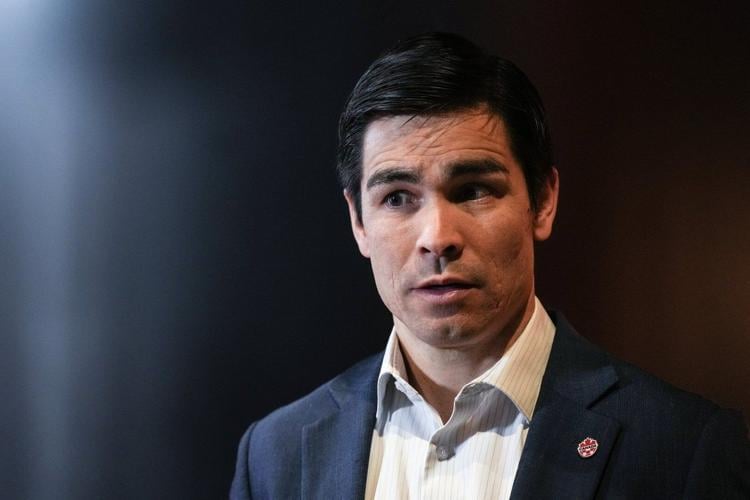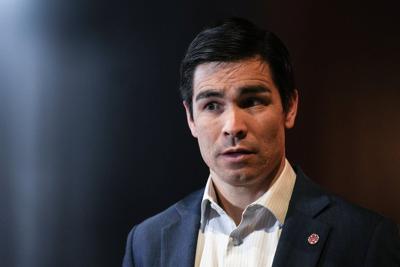Canada Soccer has disciplined 14 coaches and administrative staff in the wake of the Paris Olympic drone spying scandal that cost coach Bev Priestman and two of her staff their jobs.
The governing body disclosed the news in an update this week following a meeting of its board of directors. But it did not identify the employees involved or disclose the exact nature of the sanctions.
“We can’t elaborate on those details for privacy reasons, but what we can say is that the breadth of discipline reflected how the issue pervaded multiple aspects of the organization, to varying degrees, over several years,” Canada Soccer said in a separate statement Saturday. “We sought to understand its root causes from a cultural perspective.Â
“We have since put in place measures to ensure these cultural shortfalls do not happen again.”
Priestman, assistant coach Jasmine Mander and analyst Joseph Lombardi were handed one-year bans by FIFA after New Zealand’s Olympic Committee filed a complaint with the International Olympic Committee’s integrity unit, alleging drones were flown over two pre-tournament practice sessions at the Paris Olympics.
Lombardi resigned shortly after the Olympic Games. Priestman and Mander have also left, with Priestman now coaching a club side in New Zealand.
A disciplinary committee hearing into John Herdman, triggered by the scandal, resulted in a written admonishment for the former Canada men’s and women’s coach.
“I was surprised by the entire thing as it unfolded,” Canada Soccer CEO Kevin Blue said Saturday when asked if he was surprised by the number of staff involved. “But it’s our responsibility to examine the roots and we did that thoroughly.”
The Canada Soccer update provided several other nuggets.
The governing body has started an “initial feasibility assessment” for a national training centre, promising “an open and transparent process to determine its location.”Â
The hope is to use legacy funding from FIFA that traditionally goes to World Cup hosts. While such funding in not yet confirmed, Blue said the plan is use “some sources of funding that are tied, in fact, to the World Cup and World Cup’s legacy.”Â
Canada Soccer has already looked at existing national and club training centres for design and facility options.
On the financial front, Canada Soccer says its deficit in 2025 is expected to be less than the $2.4 million originally forecast. The deficit was $4 million in 2024.
“Our intent is to be (at) break even in 2026,” Blue said in an interview.
Canada Soccer has doubled its investment in its national youth teams and provided the fledgling Northern Super League with a $1-million contribution, part of a multi-year agreement that matches the annual support the Canadian Premier League is getting.
The governing body sounded positive about talks “to find common ground” with James Johnson, the new CEO of Canadian Soccer Business which looks after marketing and broadcast rights for both Canada Soccer and the Canadian Premier League, now in its seventh season.
Canada Soccer announced a year ago that it had reached a “framework” for a long-awaited labour agreement with its men’s and women’s national teams. But the deal was contingent on a reworked deal with Canadian Soccer Business, whose investor group and board includes the CPL owners.Â
“I think both sides understand the urgency and the importance of achieving alignment, particularly given the environmental opportunities that exist right now with the home World Cup around the corner,” said Blue.
The players are getting paid in the interim under terms of the agreed-upon framework.
The women’s team’s previous labour deal expired at the end of 2021. While it had previously reached an interim labour agreement with Canada Soccer, that deal was tied to the men’s negotiations given the pay equity provisions of the deal.
The Canadian women formed their players’ association in 2016.
The men are negotiating their first formal agreement after forming their own players association, the Canada Men’s National Soccer Team Players Association, in the summer of 2022.
Canada Soccer also disclosed it’s putting its Ottawa office up for sale. Built in 1876, the building served as the residence of Canada’s third prime minister. It is looking for “a more effective and efficient workspace” for its Ottawa-based staff, in addition to a small satellite location now open in Toronto.
Also this week, ahead of Tuesday’s National Day for Truth and Reconciliation, Canada Soccer announced the launch of a new Indigenous Working Group.
“Soccer is Canada’s most participated sport,” said Blue. “It is Canada’s most accessible sport and (with) that accessibility and the love for soccer, it is our responsibility to make sure that that includes Indigenous communities of all kinds across Canada, especially as the World Cup takes centre stage.
“So this working group is meant to be a platform for appropriate collaboration and engagement with Indigenous communities across Canada.”
—-
This report by The Canadian Press was first published Sept. 27, 2025






























To join the conversation set a first and last name in your user profile.
Sign in or register for free to join the Conversation